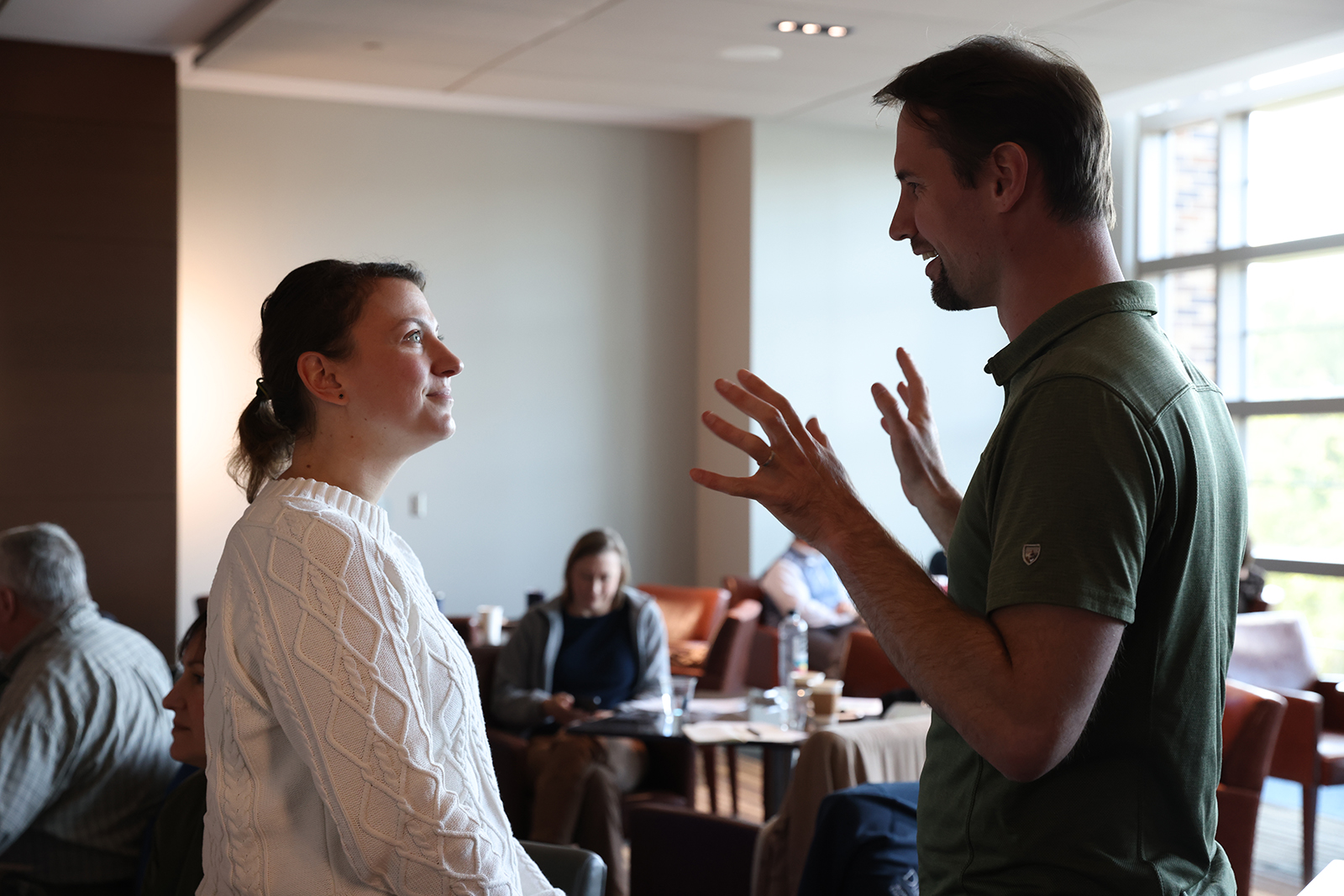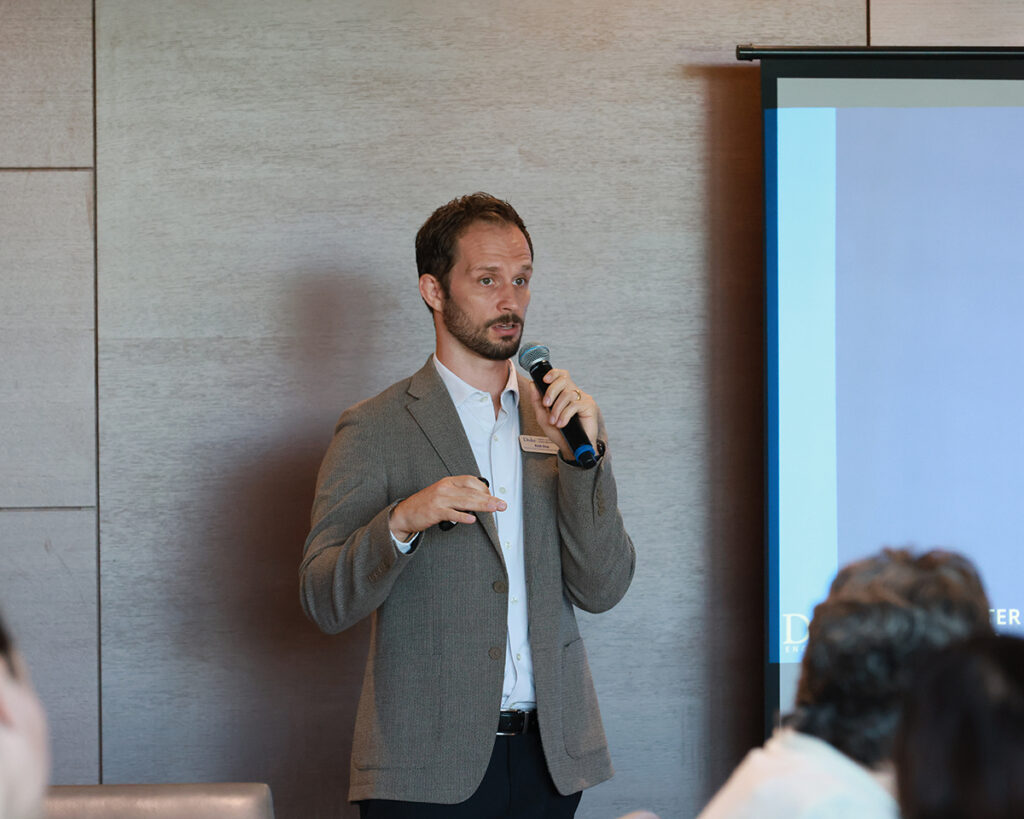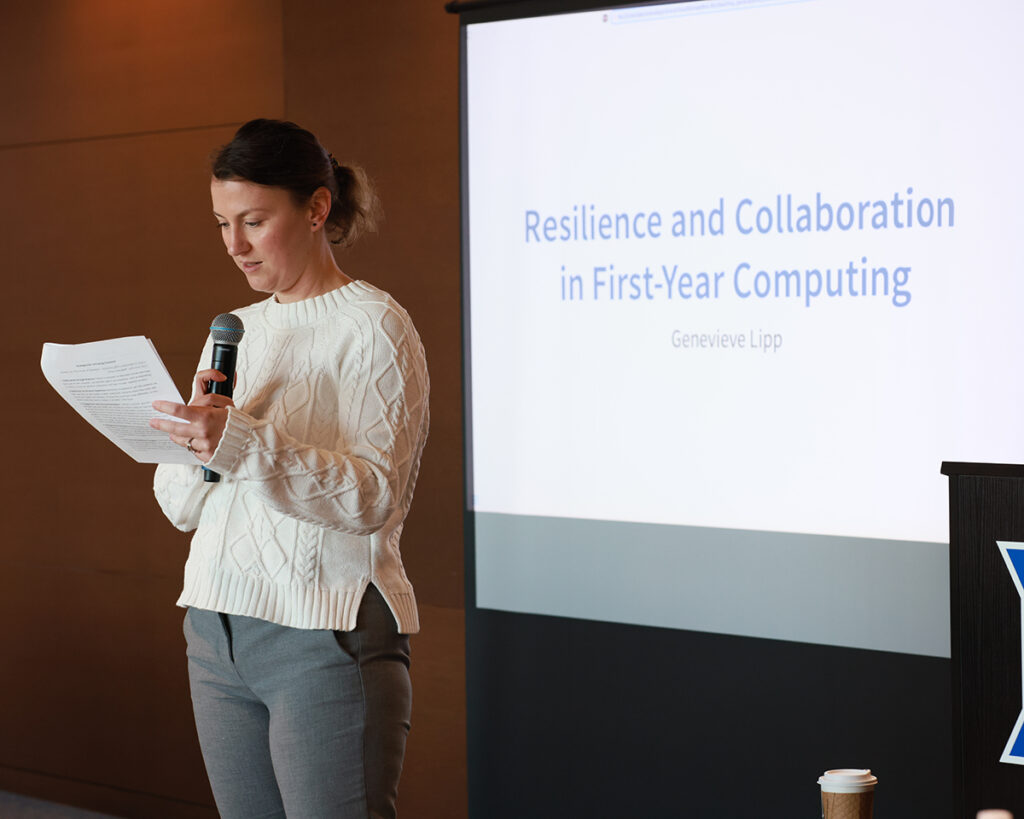To Help Engineers Build Better, Character Forward Aims to Build Better Engineers

Mid-presentation, Rich Eva tried to advance his PowerPoint, and failed. “I think I just broke the clicker,” he said.
“There might be an engineer here who can help you!” someone called out.
Laughter rang out, because Eva’s audience was almost entirely faculty and staff from the Pratt School of Engineering.
Eva is not an engineer. After earning a Ph.D. in philosophy at Baylor University earlier this year, he joined the Pratt School of Engineering to direct a new initiative, Character Forward. Created to help integrate ethics into the undergraduate engineering curriculum, Character Forward is a partnership between Pratt and The Purpose Project at Duke, which is a collaboration between the Kenan Institute for Ethics, Duke Divinity School, and the Office of the Provost, funded by The Duke Endowment.

At a recent workshop on character education, Eva asked attendees to discuss how much they learned about ethics in their training as engineers. Many of the professors in the room shared that they had no exposure to ethics in their undergraduate education at all.
By not incorporating ethics into curricula, Eva said, we can inadvertently send the message that they don’t matter. He pointed to studies showing that the students at the end of an average engineering education leave with less concern about others’ well-being than when they started.
“Engineering undergraduates are coming away with less empathy,” he said. “No one was explicitly trying to teach students that, but somehow, something was communicated that ended up shifting them that way.”
Eva acknowledged that engineering faculty might be worried about teaching ethics because they felt they lacked the necessary expertise. He assured them that you don’t need to know the correct answer to every moral question to teach ethics.
In fact, he said, there are compelling reasons to take a different approach: by focusing less on the question of “What is the right or wrong thing to do?” and more on “What kind of person I should be?”
“A lot of engineers will face problems that we are not able to think of,” Eva said. Instead of preparing them with ethical knowledge, he said, “It’s a better bet to make them better people who can make better decisions.”
Character education aims to do this by habituating virtues, or positive character traits. “Virtues are stable dispositions to do the right thing, at the right time, in the right way, and for the right reasons,” Eva said.
Two professors gave presentations on the ways they’re intentionally weaving character education into their current courses.


Genevieve Lipp discussed her first-year computing course, where she creates structures to teach resilience. Feedback loops, for example, help students to “engage in the learning cycle even when there are setbacks,” which can also promote another virtue: temperance.
Can first-year students display temperance? “Some do!” Lipp said. And this also helps them to master the material. “Self-control is how you make the most of a learning cycle,” she said.
While Cameron Kim teaches a dedicated course on the ethics of biomedical engineering, he also prioritizes character education in his course on Modeling Cellular and Molecular Systems. He lists developing curiosity and intellectual humility as course objectives on the syllabus, and he asks students to take quizzes by The Greater Good Science Center at UC Berkeley to measure how well they demonstrate these virtues and to reflect on their scores.
“I was in awe of what they reflected on,” Kim said. “Students were humble and said, ‘This taught me a lot about myself.’”
Other professors shared strategies for building character outside of the classroom, including David Schaad and Ann Saterbak, who lead DukeEngage programs in developing countries. Working with less-resourced communities teaches students humility, resourcefulness, and gratitude, they said.
Highlighting the need for engineering students to develop empathy and kindness, Bill Walker pointed out that the highest-performing teams at Google had one common characteristic: psychological safety. “Creating an environment of safety can shape what people rise to,” he said.

Siobhan Oca, who teaches a course on Case Studies on Ethics in Robotics and Automation, emphasized that she sees Character Forward as a growth opportunity.
“There’s so much to learn, and I’m so glad we have Rich Eva coming in and helping to facilitate this at Pratt,” she said.
During the workshop, Eva emphasized that he believed that integrating ethics into the engineering curriculum should take a bottom-up approach, not a top-down one. Oca echoed this.
“I think that this effort, if it’s going to be incremental in every class, needs to be incremental in every class,” she said. “There are already things that we do in preparing engineers who are doing things for the good of society, but being intentional will have a bigger and better effect.”
Incorporating character education across the curricula — not just in specialized courses — is important, she said. “If we’re reinforcing these ideas, that’s how we end up with the best students we can at the end of their college experience.”
